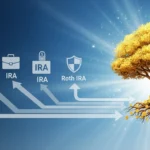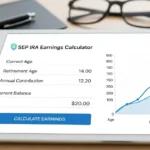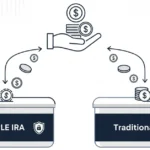Welcome to smartretireplans.com!
For decades, the standard path to retirement has involved investing in stocks, bonds, and mutual funds. These traditional assets have long been the foundation of a sound retirement plan. However, a growing number of savvy investors are realizing there’s a powerful way to expand their retirement portfolio beyond the stock market: by using a Self-Directed IRA (SDIRA) to invest in real estate.
A self-directed IRA allows you to use your retirement funds to purchase tangible, income-generating assets like residential homes, commercial properties, raw land, and even private mortgage notes. This level of control can be a game-changer, offering the potential for portfolio diversification, a hedge against market volatility, and a consistent income stream.
But with this incredible freedom comes a crucial question: “Which is the best self-directed IRA for real estate investing?”
The answer isn’t a single name. The “best” company is the one that best fits your specific investment strategy, budget, and experience level. In this comprehensive guide, we will provide you with all the information you need to make an informed decision. We will walk you through:
- The essential IRS rules you absolutely must follow.
- Detailed reviews of the leading SDIRA custodians for real estate.
- A clear comparison of their fees, services, and key features.
- A step-by-step guide to get started.
Let’s dive in and learn how to use your retirement savings to build a real estate empire.
Part 1: The Essential Rules of Real Estate SDIRAs
A self-directed IRA is not a free-for-all. To maintain the tax-advantaged status of your account, you must strictly follow IRS rules. Ignoring these rules can lead to severe penalties, including disqualification of your IRA and hefty tax bills. The two most critical concepts to understand are “Prohibited Transactions” and “Disqualified Persons.”
What is a Disqualified Person?
The IRS defines a disqualified person as anyone who is closely related to you, and with whom your IRA cannot transact. This includes:
- You, the IRA account holder.
- Your spouse.
- Your ancestors (parents, grandparents).
- Your direct descendants (children, grandchildren, their spouses).
- Any entity (like an LLC or corporation) that you or a disqualified person owns or controls.
What is a Prohibited Transaction?
A prohibited transaction is any direct or indirect dealing between your IRA and a disqualified person. In the context of real estate, this means you absolutely cannot use the SDIRA-owned property for your personal benefit or for the benefit of any disqualified person.
This rule is often referred to as the “no self-dealing” rule. Here’s what it means in practice:
- No “Sweat Equity”: You cannot perform any repairs, maintenance, or improvements on the property yourself. All labor must be performed by a third-party contractor who is paid with funds from your IRA.
- No Personal Use: You, your spouse, or your children cannot live in the property, use it for vacation, or store personal belongings there, even for a single day.
- No Personal Payment of Expenses: All expenses related to the property, including property taxes, insurance, and utilities, must be paid directly from your SDIRA’s bank account. You cannot use your personal funds and reimburse yourself later.
- No Buying from or Selling to Disqualified Persons: Your SDIRA cannot purchase a property you personally own, and you cannot sell a property from your SDIRA to yourself or a disqualified person.
The Role of the Custodian
Your SDIRA is legally required to have a custodian. This is a financial institution, like a bank or trust company, that holds the assets, handles all the paperwork, and reports to the IRS. They do not provide investment advice; they are simply the administrative backbone that ensures your transactions comply with IRS rules. Choosing a good custodian is therefore the most important step in your real estate SDIRA journey.
Part 2: Top SDIRA Custodians for Real Estate Investing
Finding the right SDIRA custodian is about balancing fees, customer service, investment options, and technical expertise. Here are the top companies that specialize in self-directed real estate.
1. Equity Trust Company
The Established Leader for Comprehensive Service
Equity Trust is one of the most recognized and experienced names in the SDIRA space, having been in the business for over 40 years. With a massive client base and tens of billions in assets under custody, they offer a sense of security and institutional stability that many investors seek.
- Pros:
- Extensive Experience: Their deep-seated knowledge of IRS rules and complex alternative investments makes them an excellent choice for both beginners and seasoned investors.
- Educational Resources: They have a robust library of webinars, guides, and educational materials to help investors understand the nuances of SDIRA investing.
- Diverse Investment Platform: Equity Trust supports a huge variety of assets beyond just real estate, including private equity, precious metals, and private lending, which is great for those who want to diversify further.
- Cons:
- Complex Fee Structure: Their fees can be more complicated than other providers, with a mix of annual fees and transaction-based fees. This can make it difficult to predict costs without a clear investment plan.
- Higher Fees for Smaller Accounts: Their fees can be higher than competitors, especially for accounts with lower balances.
- Best For: Investors who value a long track record, extensive support, and a one-stop-shop for a wide variety of alternative investments.
2. IRA Financial
The Checkbook Control Powerhouse
IRA Financial has built its reputation on offering the “checkbook control” SDIRA-LLC structure. This allows you to set up a Limited Liability Company (LLC) that is owned by your IRA. The LLC has its own bank account, giving you the ability to write checks and make investments without having to get custodian approval for every single transaction.
- Pros:
- Checkbook Control: This is their standout feature. It allows for lightning-fast investment decisions, which is critical in a competitive real estate market where you need to move quickly.
- Flat Fee Structure: They offer a clear, transparent, flat-fee model with no hidden charges. This simplicity is a major advantage for large portfolios, as fees don’t scale with account value.
- In-House Legal Team: IRA Financial has an in-house legal team that helps with compliance and setting up the LLC, providing a valuable layer of protection and expertise.
- Cons:
- Higher Initial Setup Fee: Setting up the IRA-LLC can have a higher initial cost compared to a traditional custodian-controlled SDIRA.
- Requires More Hands-on Management: While checkbook control gives you freedom, it also places more responsibility on you to ensure every transaction is IRS-compliant.
- Best For: Experienced, hands-on real estate investors who need speed and flexibility to jump on time-sensitive deals.
3. uDirect IRA
Best for Real Estate-Focused Investors
Founded by real estate professionals, uDirect IRA has a specialized focus on real estate assets. This expertise is reflected in their customer service, which is highly rated for its personalized support and guidance on real estate-specific transactions.
- Pros:
- Real Estate Expertise: Their staff is intimately familiar with the nuances of real estate investing, from title transfers to non-recourse loans, making them an excellent guide for new and experienced investors alike.
- Low, Flat Fees: uDirect IRA offers a straightforward and competitive flat-fee structure, making it a cost-effective option, particularly for investors with larger account balances.
- Strong Customer Service: They are known for providing dedicated account management and personalized service, which is a major benefit for navigating the complexities of SDIRA rules.
- Cons:
- Fewer Non-Real Estate Options: While they do support other alternative assets, their core expertise is real estate. If you plan to diversify into other unique assets, they may not be as comprehensive as Equity Trust.
- Best For: Investors who are exclusively focused on real estate and want a custodian that truly understands the industry.
4. Rocket Dollar
The Modern, Tech-Focused Option
Rocket Dollar brings a modern, streamlined approach to self-directed investing. Their platform is built for speed and simplicity, making it a great choice for tech-savvy investors who appreciate a user-friendly interface. They also offer a checkbook control-like structure for a simplified flat fee.
- Pros:
- Simple Pricing: They offer a clear, subscription-based pricing model that makes it easy to understand your costs, regardless of the size of your portfolio.
- User-Friendly Platform: Their online dashboard is intuitive and makes it easy to manage your investments and track your assets.
- Good for Large Portfolios: Their pricing model, which is not based on assets under management, makes them a very attractive option for investors with large retirement accounts.
- Cons:
- Newer Company: While growing rapidly, they have a shorter track record than industry veterans like Equity Trust.
- Less Hands-on Support: Their tech-focused model means they may not provide the same level of personalized, one-on-one guidance as a company like uDirect IRA.
- Best For: Investors who are comfortable with technology, have larger portfolios, and want a simple, transparent fee structure.
Part 3: SDIRA Custodian Comparison at a Glance
| Feature | Equity Trust | IRA Financial | uDirect IRA | Rocket Dollar |
| Best For | Overall Stability & Diverse Assets | Hands-On Checkbook Control | Real Estate Specialists | Tech-Savvy Investors |
| Setup Fee | $50+ | $999 (for LLC) | $50+ | $360 |
| Annual Fee | Varies (Asset-based & flat) | $495 (flat rate) | $275+ (flat rate) | $360/year (subscription) |
| Checkbook Control | Yes (via LLC) | Yes (core service) | Yes (via LLC) | Yes (core service) |
| Customer Support | Very strong, extensive resources | In-house legal support | Exceptional, real estate-focused | Streamlined, tech-driven |
| Key Differentiator | 40+ years of experience & scale | IRA-LLC with in-house counsel | Founded by real estate professionals | Simplified tech and pricing |
Part 4: A Word on Unrelated Business Taxable Income (UBIT)
One of the more complex rules of SDIRA investing is Unrelated Business Taxable Income (UBIT) and its cousin, Unrelated Debt-Financed Income (UDFI).
- What it is: If your SDIRA uses a non-recourse loan to purchase a property, a portion of the income generated by that property (equal to the loan-to-value ratio) may be subject to UBIT. This is an exception to the tax-free growth of your IRA and can result in a tax liability for your IRA.
- The IRS’s View: The IRS views the income from debt-financed property as an “unrelated business” because it’s not directly funded by your tax-advantaged contributions.
- The Cost: If your IRA generates UBIT, you must file a Form 990-T and pay a tax. The tax rate for UBIT is the same as the trust tax rate, which can be quite high.
Working with an experienced SDIRA custodian that understands these rules is crucial to properly file and manage any potential UBIT liability.
Part 5: Your Step-by-Step Guide to SDIRA Real Estate
- Educate Yourself: Start by thoroughly researching the types of real estate investments that interest you. Understand the market, the risks, and the potential returns.
- Choose the Right Custodian: Based on your investment strategy, choose a custodian that aligns with your needs. Consider their fee structure, customer service, and whether they offer checkbook control.
- Open and Fund Your SDIRA: Complete the application with your chosen custodian. You can fund your account with a direct contribution, a transfer from an existing IRA, or a rollover from an old 401(k).
- Find Your Property: With your SDIRA funded, you can now search for real estate investments. Remember to follow all IRS rules regarding disqualified persons and prohibited transactions.
- Submit the Transaction: The process for making an investment varies by custodian. For a custodian-controlled SDIRA, you will submit a “buy direction letter” and all relevant documents. For an IRA-LLC with checkbook control, you simply write a check from the LLC’s bank account.
- Manage and Maintain Compliance: Once the property is in your SDIRA, all income and expenses must flow through the account. Keep meticulous records and ensure you’re not violating any prohibited transaction rules.
Final Thoughts : The Best Self-Directed IRA for Real Estate Investing
Investing in real estate with a self-directed IRA is one of the most powerful and rewarding ways to build wealth for your retirement. It offers unique tax advantages and the potential for greater control and higher returns. However, it’s not a set-it-and-forget-it strategy. It requires careful planning, diligent research, and a strict adherence to IRS rules.
The “best” SDIRA provider for you will depend on your individual goals. If you value stability and a wide range of investment options, Equity Trust may be a great fit. If you prioritize speed and hands-on control, IRA Financial or Rocket Dollar could be your ideal choice. If you want a specialist with a laser focus on real estate, uDirect IRA is an excellent option.
As with all complex financial decisions, we strongly recommend consulting with a qualified financial advisor and tax professional before embarking on your SDIRA journey. Their expertise can help you navigate the complexities and ensure you build a real estate portfolio that is both profitable and compliant.
FAQ
Can I use my SDIRA to buy my primary residence?
No. This would be a prohibited transaction, as you, a disqualified person, would be personally benefiting from the property.
What is a non-recourse loan?
A non-recourse loan is a type of financing where the lender’s only recourse in case of default is the property itself. They cannot come after your personal assets. This is the only type of loan your SDIRA can use for real estat
Can I partner with my IRA on a real estate deal?
Yes, you can. You can use your personal funds to invest alongside your IRA, as long as the investment is structured as a partnership (e.g., a multi-member LLC). However, all expenses and income must be handled proportionally, and you cannot have any dealings with the IRA’s portion of the investment.
Can I use a traditional or a Roth IRA for a self-directed account?
Yes. You can set up a self-directed Traditional IRA, Roth IRA, SEP IRA, or even a Solo 401(k). Each has the same tax benefits as its non-SDIRA counterpart.














